MercoPress. South Atlantic News Agency
Tag: Loligo
-
Saturday, March 11th 2023 - 23:48 UTC
2022 Was a Boom Year For Falklands Squid and Finfish Fleets
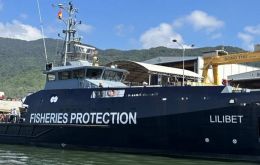
Fisheries authorities in the Falkland Islands have said that 2022 was a bumper year for the squid and hake fishing fleets licenced by the territory. Sixteen ships caught a remarkable 101,166 tonnes of loligo squid; a catch that was exceeded only in 1989 when 118,120 tonnes were landed, although that record catch was achieved by almost three times as many ships.
-
Wednesday, January 11th 2023 - 10:35 UTC
Falklands' Loligo squid licenses prices climb 12% for the coming season beginning 26 February
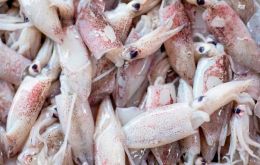
As the vessels catching Loligo squid leave Spain for the Falkland Islands, a leading newspaper from Vigo, closely linked to the Galician fishing industry lobby, El Faro de Vigo, praises the management of the Falklands fisheries, and catch results, but also complains about the cost of licenses, particularly since Falklands' Loligo entering the European Union is subject to tariffs. The piece on Falklands fisheries follows,
-
Friday, November 4th 2022 - 10:06 UTC
Falklands' largest Loligo catches since 1989, but world conditions have changed dramatically
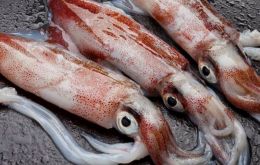
Falkland Islands have experienced an extraordinary Loligo year with catches reaching 101,073 tons in the two season, 54,417 in the first and 43,216 in the second. However great volumes also have their shortcomings, particularly since Falklands' fishing industry this year has had to face dearer fuel and transport costs, and not all the catch has been sold.
-
Friday, January 22nd 2021 - 09:39 UTC
Covid-19 positive cases in some vessels expected in Falklands for the Loligo season

The Falkland Islands government and local industry have given reassurances following cases of Covid-19 identified on Loligo fishing ships due to the Falklands from Galicia. Penguin News investigated reports of positive cases on vessels bound for the Islands and asked for comment from FIG, who responded in writing:
-
Friday, September 11th 2020 - 08:48 UTC
Falklands describes start of second Loligo season this year as “exceptional”
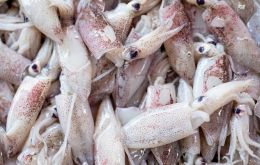
The Falkland Islands' second Loligo season this year has had an “exceptional start” the Director of Natural Resources Dr. Andrea Clausen told the Fisheries Committee last Thursday.
-
Thursday, May 2nd 2019 - 19:03 UTC
Loligo squid season in Falklands with over 51.000 tons while iIlex falls

The first season of the two loligo (Falklands calamari) seasons of 2019 closed with total catches of 51,000 tonnes, a 10,000 increase on the first season of 2018 and less than 30,000 tonnes short of the total for both 2018 seasons, 78,913 tonnes.
-
Monday, January 21st 2019 - 08:19 UTC
Vessels leaving Vigo for the Falklands' Loligo season; Argentina reports good catches of Illex
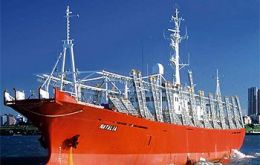
While the Spanish fleet of fishing vessels, many of them partners of Falkland Islands companies have started leaving Vigo for the South Atlantic to begin the Loligo season on 24 February, Argentine licensed jiggers operating south of parallel 44 have been catching some 25 tons per day per vessel of Illex, according to the first reports from Pescare.com.ar.
-
Wednesday, October 24th 2018 - 08:55 UTC
Falklands' calamari catches this year among the most productive
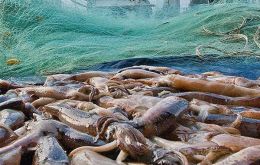
The Falkland Islands calamari, Loligo, season has been one of the best in recent years with catches totaling some 78.913,81 tons, which represents a 25% over the previous season, according to reports in the Galician media, and confirmed by the Islands Natural Resources Department.
-
Tuesday, March 6th 2018 - 09:22 UTC
Falklands' calamari fishery: vessels equipped with robust seal exclusion devices
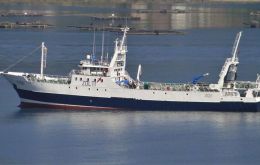
Falkland Islands Director of National Resources, John Barton, reported that after a slow start, fishery catches were beginning to pick up: trawlers had started operating and there were only a few jiggers still to collect their licenses.
-
Thursday, March 1st 2018 - 09:31 UTC
Falklands: Spanish trawlers hope the Loligo season evolves with “no incidents”
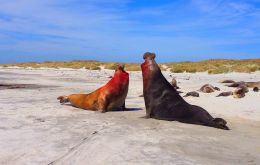
Spanish trawlers involved in the Loligo squid catching season in the Falkland Islands are hoping that this year the operation will evolve with “no incidents”, recalling that the previous season was abruptly stopped because of accidental deaths of sea mammals caught in nets.
